Marikana Strike: South Africa To Release Unrest Miners

Earlier, the charges, levelled under an apartheid-era law, were suspended following a national outcry.
The first 100 miners will be freed on Monday, and the rest on Thursday.
Also on Monday, talks are set to resume on ending the strike that led to killing of the 34 workers at the Marikana platinum mine.
Police says they opened fire on the strikers in self-defence after being threatened by a crowd of protesters who advanced towards them, armed with machetes.
The strike, called in support of demands for a substantial pay rise and recognition of a new union, continues and the mine remains closed three weeks on.
The mine’s owner, Lonmin, the world’s third-largest platinum producer, says the industrial action is illegal.
But it has dropped its demands that the strikers go back to work or face the sack.
After the shootings, state prosecutors invoked the apartheid-era “common purpose” doctrine to charge the 270 miners arrested during the violence with provoking police to open fire.
The rule was used by the white-minority apartheid regime to crack down on its black opponents, at the time mainly represented by the currently governing African National Congress.
Outcry
On Sunday, the acting national director of prosecutions, Nomgcobo Jiba, held a news conference to announce the charges would be provisionally dropped
She added, however, that the charges cannot be dismissed formally until the end of the inquiry.
Those whose addresses have been verified by police will be released on Monday, and the rest will remain in custody until their next court appearance on Thursday, Ms Jiba said.
The decision to charge the men had drawn condemnation from political parties, trade unions, activists and legal experts.
On Friday, Justice Minister Jeff Radebe demanded a report from state prosecutors to explain the reasoning behind it.
The BBC’s South Africa analyst Farouk Chothia says move the shelve the charges has salvaged some of the government’s credibility.
But he says the government will have to make sure that the miners co-operate with the judge-led commission of inquiry that was set up by Mr Zuma to investigate the 16 August shootings.
South African media reports suggest some of the mine workers have decided to hold their own inquiry into the killings, which would create more embarrassment for Mr Zuma, says our correspondent.
On Saturday, the arrested miners’ lawyers asked President Jacob Zuma to free the men, but he issued a statement saying he would not intervene in the case.
The violence at the mine, near Rustenburg, about 80km north-east of Johannesburg, reminded many of the apartheid-era treatment of opposition protesters.
No police officers have been charged over the deaths because a judicial inquiry and an internal police review are under way, but these are expected to take several months to complete.
The strike turned violent before the police shooting, with the deaths of 10 people including two police officers and two security guards who were hacked to death.





